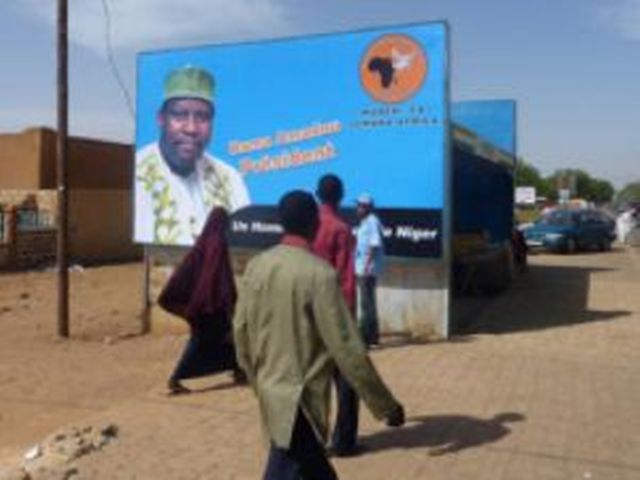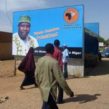
AQIM Operations Threaten Niger’s Return to Democracy
Publication: Terrorism Monitor Volume: 9 Issue: 7
By:

Almost one year after the military coup that overthrew former Nigerien president Mamadou Tandja, the people of Niger are in the process of choosing a new president. One of the most important challenges that the new president will face is the increasing role that al-Qaeda in the Islamic Maghreb (AQIM) plays in the impoverished country.
AQIM’s Growing Presence in Niger
The recent killings of French citizens Antoine de Léocour and Vincent Delory, abducted in downtown Niamey, as well as the kidnapping in southern Algeria of Italian tourist Maria Sandra Mariani, who was immediately taken by her captors to Niger, demonstrate AQIM’s growing presence in Niger (see Terrorism Monitor, January 27; Adnkronos, February 4; El Watan [Algiers], February 5). In September 2010, seven uranium industry employees of the Areva and Satom companies (including five French, a Togolese and a Malagasy) were abducted and still remain in the hands of their AQIM kidnappers, while in April 2010 AQIM seized French citizen Michel Germaneau in northern Niger before killing him three months later. This sequence shows increased activity in Niger by AQIM and its local criminal associates. Since Niger is a structurally weak and poor country, the emergence of this threat could represent a major problem for the new president.
The Democratic Transition
Nigeriens voted to choose a new president on January 31, though results were not announced by the electoral commission until February 4. Mahamadou Issoufou, leader of the Parti Nigérien pour la démocratie et le socialisme (PNDS) won 36% of the votes, while Seïni Oumarou, former prime minister from 2007 to 2009 and the candidate of Mamadou Tandja’s Mouvement national pour la société de développement (MNSD), came in second with 23%. These are the two candidates that will contest the March 12 run-off, with results expected to be announced on April 4 (Courrier International [Paris], February 1; Afrik.com, February 4).
Legislative elections held at the same time gave the PNDS 39 of 113 seats, while the MNSD was second with 26 MPs (Tamtam.info, February 3). The elections have so far been considered free and fair by observers from the European Union and the Economic Community of West African States (ECOWAS) (Tamtaminfo, February 2; AFP, February 2).
The Nigerien Context
Shortly after the kidnappings of the two Frenchmen in Niamey, European governments released several statements concerning the increased risks for its citizens in Niger. On January 9, the Italian Foreign Affairs Ministry recommended avoiding any kind of travel in the country. [1] France did the same with an announcement on its Foreign Affairs Ministry website. [2] Niger is facing the same problem as Malì; even though the number of kidnappings is low compared to places such as Central and South America, the al-Qaeda label makes them far more worrisome for Western governments (see Terrorism Monitor, October 28, 2010).
Niger is among the poorest countries of the world according to a number of indices:
• It ranked 167 out of 169 in the latest United Nations Development Program (UNDP) Human Development Report. [3]
• Its Multidimensional Poverty Index (MPI) is 0.64 – on a scale from 0 to 0.7 – the worst worldwide. According to this index, Niger’s poor represent 92.7% of the population. [4]
• The 2010 Failed State Index ranked Niger 20th out of 60 countries at “risk.”
Among the twelve indicators, Niger scored the worst in public services (9.7/10) and has very poor performances regarding demographic pressure ( 9.6/10), economic decline (9.2/10) and destabilization of the state (8.9/10). Here, Niger is described as likely the poorest country worldwide and one in which public authority lacks any ability to provide services such as education and health care. [5] Moreover, in the past few years, the country has suffered several environmental disasters which further worsened the economic and health conditions of the population.
The most important economic resource for Niger is its uranium deposits, which rank in the top five internationally. Another important economic resource for the country is represented by tourism; the Sahara desert and the Niger River represent two main attractions for tourists, most of whom come from Europe.
AQIM’s Impact on Niger
AQIM’s threat to Niger emerged in late 2008, when two Canadian diplomats were abducted before being released in April 2009. Niger is one of the areas in which the two main Sahelian factions of AQIM, led by Mokhtar Belmokhtar and Abdelhamid Abu Za’id, struggle for money, prestige and influence. Belmokhtar has been accused of being the organizer of the abductions of Léocour and Delory in Niamey (Le Parisien, January 12). Abu Za’id is believed to hold the uranium industry hostages taken in September (France 24, September 23, 2010). A major feature of AQIM activities in the past few months has been the increasing rivalry between its Sahelian factions, which act autonomously from the central leadership.
The structural weakness of Niger makes it particularly attractive for the pursuit of illegal activities. To assess the correct impact of AQIM on Niger, however, the political dimension of the threat should be separated from the security dimension. On the political level, AQIM does not represent a consistent or existential threat to the country. AQIM’s ability to provide a true political alternative in Niger is extremely low. More than other regional groups linked to al-Qaeda, AQIM seems to be absolutely incapable of playing a truly political role in the theaters in which it operates, failing to provide a clear political program.
AQIM also lacks the capacity to be the catalyst of dissatisfaction and rage against governments in power. Moreover, the consistent lack of any attempt to “Africanize” the different levels of AQIM leadership is a major blow for AQIM penetration in the area. Despite its increasing regional role in the Sahel, AQIM remains an Algerian organization in its leadership. AQIM recruits new members in the Mauritania, Mali and Niger, but these are little more than gunmen having few, if any, opportunities to climb the internal hierarchy of the group.
AQIM seems to be simply a group focused on illegal and parasitic activities. The threat for Niger is thus strictly related to security issues. Niamey has few resources to devote to confronting these groups and has a very low ability to secure effective control of its territories and its borders. The latest kidnappings, which occurred in the downtown Niamey Plateau district, supposedly one of the best guarded areas in the country, demonstrate this weakness (see Terrorism Monitor, January 28).
The widespread poverty in Niger can provide fuel for AQIM activities, but not in terms of political proselytism. Unemployed youth could join the organization striving to get a salary. The high ransoms paid by European governments to save their citizens make the “kidnapping industry” very attractive and lucrative. Getting a slice of this business does not necessarily mean that people have to be involved within AQIM; they simply need a connection with AQIM leaders to sell hostages to the group. This industry creates an army of local mediators, which try to get as much as they can using their local connections. Widespread poverty also makes it is easier to corrupt local officials and police.
Moreover, there is another aspect to take into consideration- the impact of kidnappings on the economic activities of the country. In late January, Areva and Satom announced the reduction of their foreign workforce in the country. Areva, whose main stakeholder is the French government, is the most important player in the Nigerien uranium sector, owning 63% of the Société des Mines de l’Air (SOMAIR) and 34% of Compagnie Minière d’Akouta (COMINAK), the two joint ventures created to exploit Niger’s uranium resources.
Access to uranium is a strategic interest for France. Paris needs Nigerien uranium to supply its own civil reactors and to sustain its nuclear weapons program. France is also the major external player in the country because of its past colonial ties and continuing economic interests. Even though Areva’s monopoly ended in 2007, with the entrance of Chinese and Indian companies in this market, it still remains the most important actor in this field. A further deterioration of security conditions could lead Areva to increasingly reduce its involvement in the country, leading France to rely on other, safer countries to satisfy its uranium needs. Security developments could also impact the tourism industry; in January 2011, the chief of Point Afrique, Maurice Freund, decided to stop the organization of travel to the Sahel. Point Afrique was one of the main operators in this sector, promoting, moreover, a responsible and sustainable tourism sector based on respect for the local people (Le Quotidien du Tourisme, January 11; Sud Ouest, January 13). The impact of the kidnappings could even outlast the restoration of security in Niger and a reduction in AQIM activities, as tourists would need some time to restore their trust and confidence in Niger’s ability to guarantee safe journeys and stays.
Conclusion
The trends of the past few months seem to be clear. AQIM activities in the country have increased and its structural weakness makes it a perfect base for AQIM factions and their local associates that use Niger to conduct kidnappings or house hostages taken elsewhere. AQIM is a security threat and not a political one since it has only a limited capacity to provide a suitable political alternative to the existing government. However, AQIM will represent a top priority in the agenda of the next Nigerien president because of the impact it has on the security of country and, above all, the economy. The uranium and tourism industries could be the targets of a sort of “economic jihad” against strategic economic infrastructures, following al-Qaeda doctrines. To avoid losing its legitimacy as a sovereign government, Niger must reduce the risk of foreign intervention to restore security and stability by safeguarding its few economic interests while improving its effectiveness in counter-terrorism efforts. These will be among the major challenges that Niger’s new civilian government must address in the next few months.
Notes:
1. Ministero Degli Affari Esteri, January 9, 2011; https://www.viaggiaresicuri.it/index.php?niger.
2. Le Ministère des Affaires étrangères et européennes, February 11, 2011; https://www.diplomatie.gouv.fr/fr/conseils-aux-voyageurs_909/pays_12191/niger_12300/index.html.
3. https://hdrstats.undp.org/en/countries/profiles/NER.html.
4. Alkire, Sabina & Maria Emma Santos. 2010. Niger Country Briefing. Oxford Poverty & Human Development Initiative (OPHI) Multidimensional Poverty Index Country Briefing Series. Available at: www.ophi.org.uk/policy/multidimensional-poverty-index/mpi-country-briefings.
5.https://www.foreignpolicy.com/articles/2010/06/21/2010_failed_states_index_interactive_map_and_rankings.





